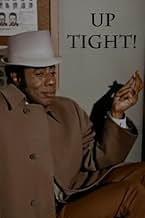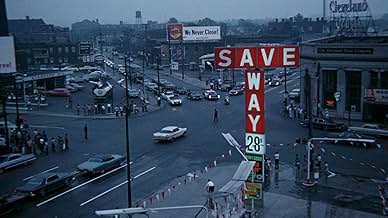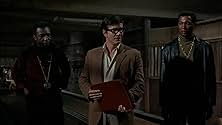Témoin d'un cambriolage, un homme dénonce l'un des voleurs, après lequel il s'adonne à la boisson et finit par se trahir.Témoin d'un cambriolage, un homme dénonce l'un des voleurs, après lequel il s'adonne à la boisson et finit par se trahir.Témoin d'un cambriolage, un homme dénonce l'un des voleurs, après lequel il s'adonne à la boisson et finit par se trahir.
- Corbin
- (as Richard Williams)
- Larry
- (as John Wesley Rodgers)
- Rick
- (as Jitu Cumbuka)
Histoire
Le saviez-vous
- AnecdotesProducer/director Jules Dassin wanted to remake Le mouchard (1935) with an all-black cast, set in inner-city America. The original Liam O'Flaherty story was based on the Irish rebellion against the English in the early 1920s. Dassin felt it mirrored black-white relations in the US in the 1960s.
- Citations
Kyle's associate: Damn, I've known you since you were a baby. I don't recognize you no more.
Jeannie: You can't! I'm off my knees now. I like my man with a gun.
Kyle's associate: Jeannie, the nonviolent program...
B.G.: Is dead! Killed by white violence, April 4th, 1968 in Memphis.
Kyle: The man who died...
B.G.: Was murdered! As were four little girls in Sunday school house. As was Medgar Evers, and after him, 47 others. Now how many of their killers went to jail? Nobody. That's over! We gotta make them know that every time they even *think* of picking up a gun against a Black man, there's a black gun waiting for them!
Kyle: That's not the way, B.G. You'll bring the whole military machine down on our heads! You, you will be the excuse for fascism in this country! You'll bring on the camps.
B.G.: Well, what the hell do you think we got now?
Kyle: Then you have no idea what it could be. I don't hate you, B.G. I don't want to see you in a camp. I don't want to see you killed. And I don't want to see you responsible for other people being killed.
Corbin: Now you listen: when you're born Black in this country, you're born dead. Don't talk to us about being killed. We know about that. You're an honest man, Kyle. Go ahead, have your meeting. Nobody's gonna bother you. You go get those bills passed. Bills the whites won't obey, anyway. You do your thing, and we'll do ours. But get this straight: I don't know about a revolution without arms, and I don't know about a revolution that doesn't punish its enemies.
- ConnexionsFeatured in C'est assez noir pour vous?!? (2022)
- Bandes originalesJohnny, I Love You
Written and performed by Booker T. Jones
Repressive, fascistic conservative policies and propaganda are constantly suppressing freethinking and truth, but they only make it rebound more outspoken and with more passion than ever before. Up Tight! is a quintessential case in point. It's a candid handling of black militancy. A little to my amazement, it doesn't cop out. There's no regressing toward an appeasing moderate end. The zeal and attitude of black revolutionaries are seen face to face with us, with little in the way of consolation for white liberals maybe even including myself.
Black communities celebrated this complete surprise discovery on my part as a film that said something for them. It had audacity enough to represent the rage of the ghetto. And its characters behave and think like it. It's outstanding that a major studio like Paramount backed and distributed this film. Whenever Hollywood itself has gotten involved in the envelope-pushing independent filmmaking sensibilities, it has made it viable for other movies to reflect on the American reality.
Julian Mayfield is sturdy as granite in his depiction of Tank, the informant. It's a thorny role since Tank is by and large garbled and unversed in his own intentions. But Mayfield moves with conviction. When Tank pays a visit to a wake, his bewilderment and anguish are so poignant. Raymond St. Jacques, as a centrist turned radical, is commanding and somewhat startling. He has awesome screen presence. Ruby Dee is affecting, moving and absolutely beautiful as Laurie, Tank's girlfriend.
Up Tight! is a high-quality and attention-grabbing film mainly owing to separate elements. It has no-nonsense and plain-spoken dialogue. It has more than a few commanding performances. It has moments of truth, as when the cops mow down a radical leader, while residents of a projects bucket down tin cans and abuse. These moments have their own life and continuation. To see them on the screen is sufficient.
Dassin returned to the U.S. after a long and transformative absence to deal with a precise time and setting, and he has a great deal he wants to show us about it. This triggers challenging changes in the movie's pitch as he moves between his underdog protagonist, a heartfelt, half-wit alcoholic informer, and the rebellious leaders, straightforward, skillful, fanatical, vicious. Our feelings become mixed. This is good! When whites saw Up Tight! in 1968, many alleged to have been troubled by the audience reaction: There was a shout of approval each time a white guy got hit. Huh. Well, this should've been an enlightening experience, affording us whites with a fraction of the same kind of gut reaction that blacks had for a seeming eternity when a black guy got hit. Or had to scuff their feet. Or had to squeeze inside the Mantan Moreland and Sleep 'n' Eat stereotypes. Up Tight! brought those days to an end, that is before black filmmakers began pigeonholing themselves.
Meilleurs choix
- How long is Uptight?Alimenté par Alexa
Détails
Contribuer à cette page

































